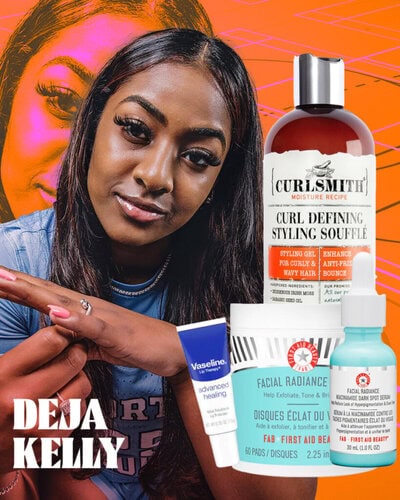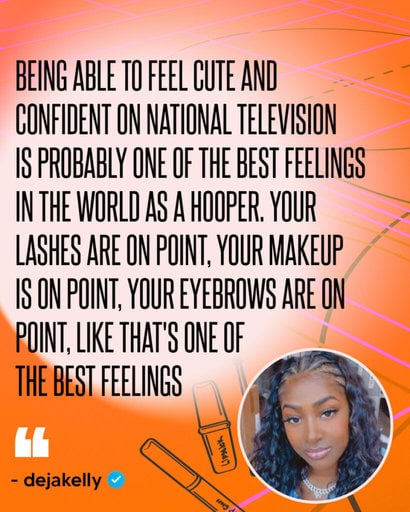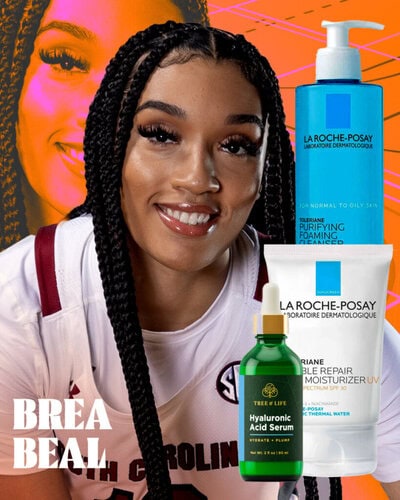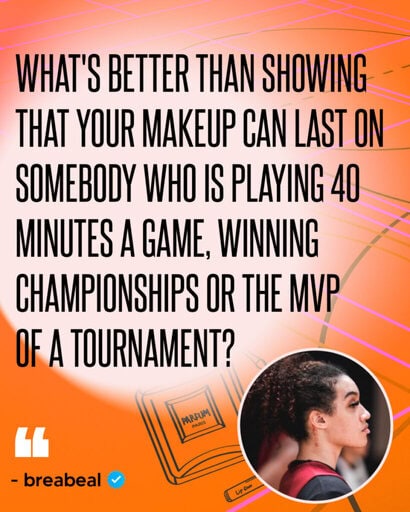In conversation with female college basketball players, beauty experts, and marketing executives, Boardroom explores the intersection of beauty and sports.
Tarte, Bare Minerals, FENTY, M·A·C Cosmetics®, all household names in the beauty industry. If you’re anything like myself or you identify as a Generation Z-er with close ties to BeautyTok — home of the beauty influencers on TikTok — you have at least one or two products from brands like these in your beauty bag.
But what happens when macro-level beauty influencers keep racking up products for free and handing them extra publicity and prestige, causing price hikes for formerly accessible mainstays and minimizing access for Black women and girls?
While young women like 22-year-old Alix Earle are earning upwards of $1.2 million per year, using their influence and notoriety to increase demand for Mielle Organics’ Rosemary Mint Scalp and Hair Strengthening Oil, girls of the same age minus the privilege, opportunities, and platforms are left to research, scour for, and purchase products they swear by without a monetary incentive behind it. And while BeautyTok girlies like Alexandra Pohl and Meredith Duxbury are flown out to Dubai on behalf of beauty brands, the girls who are doing the same work pro bono are rarely even offered an affiliate link for their support of such products in and out of their professional lives.
Are these enthusiasts not influencers all the same? According to Sheena Butler-Young, Senior Correspondent at The Business of Fashion (BoF), the definition of what it means to be an influencer, especially in the beauty, style, and fashion industry, has evolved over the course of several years from the aspiration of perfection and society’s standards of beauty to a more approachable, relatable aesthetic in an effort to connect with the brand’s audiences.
In doing so, larger beauty and fashion brands have opted to go the way of partnering with “microinfluencers” — rising stars with fewer than 100,000 followers — and favor social media personalities with a more realistic, wellness-driven, accessible appeal.
With the key pillars for a beauty influencer evolving into some combination of relatability, approachable personality, and an authentic appreciation for the products outside of monetary gain, who among us truly are the apex beauty influencers of today?
“As beauty brands look to grow their revenues and impact in this environment, it makes sense to partner with college students — the bulk of whom are part of the Gen Z cohort — and collegiate-level athletes, who in many ways epitomize the idea of health and wellness,” Butler-Young told Boardroom. “Let’s not forget that pro athletes have been doing beauty ads and sponsorships for some time now, [with] Sue Bird [and] Lexie Brown [as] examples, and even launching their own lines — remember A-Rod’s ‘Blur Stick’? So, this really feels like a natural extension.”
More specifically, the ideal influencer would be someone who tests their product better than any model, highly-paid celebrity endorser, or socialite could. Instead of someone who can test out an acne serum under a full face of makeup at a movie premiere, how about someone who already has a natural, youthful glow putting it to the test while sweating day in and day out across their daily lives? Rather than depicting a moisturizer as a primer for a red carpet debut, what if we turned our heads to someone who uses the same product as a lynchpin for achieving a camera-ready look when sprinting and flying in front of millions on ESPN?
Bottom line? Women’s college basketball players fit the bill.
According to Gen Z-centric skincare brand Bubble’s CEO and founder Shai Eisenman, it would behoove beauty brands to partner with athletes, especially at the collegiate level, and include them in conversations about influencer marketing and product placement. “Athletes especially always have to put their best face forward, and we want to empower them to feel confident in their own skin – even off the field,” she told Boardroom.
In addition to brand ambassadors such as All American star Samantha Logan and Netflix’s On My Block actor Diego Tinoco, Bubble has previously partnered with track and field star Sam Hurley and Minnesota Vikings All-Pro wide receiver Justin Jefferson, demonstrating that you don’t need to be considered a traditionally viral beauty influencer to appreciate self-care and hygiene.
“Athletes and fitness enthusiasts are another important consumer for Bubble. They are interested in products that can help them maintain the best skin. Our work clearly reflects how skincare is essential in everyone’s routine, no matter your profession,” Eisenman added. “We love working with talent that has a natural connection with skincare, but aren’t the typical influencer.”
In the midst of the highly-anticipated March Madness marker, it was time that we had the opportunity to get some one-on-one with some of the top college hoopers on the court about just how much their own routines match up with this evolving industry’s definition of being an influencer.
Boardroom spoke to UNC’s Deja Kelly, LSU’s Angel Reese, and South Carolina’s Breanna Beal about their personal relationships with their beauty routines, how they glow from the inside and out onto the court, and how we can continue to hold the beauty industry accountable as we look to the future of influencer marketing.
More Than a Game
For North Carolina Tar Heels hooper Deja Kelly, who prides herself in looking her best during every game, from laid edges to her nail colors poppin’ on the court, embracing femininity and showcasing a full face of glam on the hardwood is about more than just looking pretty — it serves as a boost of confidence while playing in front of thousands of people in arenas across the country and millions more on national television.
“I don’t really think you can go wrong with wearing makeup for games if it makes you feel good. If you think it makes you look good, which it does, then wear it,” Kelly said powerfully to Boardroom as she prepped her face with CeraVe Foaming Facial Cleanser and First Aid Beauty Facial Radiance Pads. For her, the “look good, feel good” mantra when it comes to on-court makeup is as true as ever.

Styling her hair back into a sleek ponytail with full natural curls cascading from the back — to which she refers on-camera as a “D1 do” — Kelly noted how her signature hairstyle helps her to level up mentally while she’s playing. “I think that’s something that I really take pride in. When your hair looks good, you look like you play D1 basketball and you feel like it; you feel good. Your hair looks good. That’s what my mom used to call it when I was younger, so I stick with that,” she said.
Humbly but observantly, she also noted that she pays close attention to which of her games are nationally televised in an effort to optimize around her hair, skincare, nails, and beauty routine to the fullest.
“Collegiate-level athletes work hard, play harder, and capture it all via TikTok and Instagram, making them the perfect influencers,” Mielle Senior Brand Director Nicole Ray Robinson told Boardroom. “Beauty brands have a responsibility to be inclusive and reflective of all beauty standards, and can do so by incorporating athletes in beauty messaging.”
Much like Kelly, Reese, and Beal, Robinson suggested that athletes opt for protective styles such as braids, wigs, and weaves to allow for proper hair growth between juggling academics and games. Who better to test out top-tier Mielle Organics products, such as the brand’s Braid & Scalp Moisturizer, than these ladies?
As a player herself, Kelly enjoys seeing other women’s basketball players get glammed up for a game because it makes her feel not only seen, but proud that women in a male-dominated industry can demonstrate that they can be feminine and beautiful while also showing that this isn’t just a boys’ playground. Furthermore, Kelly is fully aware that opportunities like brand partnerships and NIL endorsements can arise from looking your best and standing out from the crowd chasing around a basketball surrounded by a sea of delirious fans.

“You never know what brands are watching to where I could possibly get a partnership just from that game, just from them seeing how I carry myself on the court,” Kelly said. “That’s where I think a lot of these beauty brands are dropping the ball, because there’s so many female hoopers [and] female athletes that really take pride in their appearance on the court. I feel like so many of these beauty brands can really take advantage of that and partner with these ladies, because why wouldn’t you wanna have them show you already see that they’re showcasing their beauty on the court? Why not have them represent your brand?”
As Boardroom staff writer Randall Williams added, “When college athletes wear beauty brand products, they’re serving as walking billboards — it’s that simple. They are proving whether or not the products are of value, because in a lot of cases, they are sprinting, jumping, swinging, sweating, dancing, and so much more. If a beauty product can stay consistent while they are competing and exerting tremendous energy into their craft, it will for sure be okay for a fun night out or a party.”
While Kelly deems one of her favorite beauty influencers, Monet McMichael, as a top personality to follow on TikTok thanks to her fun, bubbly personality as a college student who’s studying nursing, she’s saddened by the fact that of all the influencers that she does follow on the social media platform, none of them are athletes like her. “I’m really hoping that these beauty brands kind of flip the script on partnering with us collegiate athletes, because it would mean the world,” she said.
While there’s no specific brand that she would have in mind to boost her personal path to influencership, she is open to collaborating with companies that would be willing to give her a chance to “up my image” as a beauty enthusiast.
“I am an influencer in a way, just as a college athlete, ’cause people are watching. People are watching your games, people are watching what you wear, what you do on and off the court,” Kelly said.
“I would say I’m an influencer in that way, as well as a lot of other college hoopers across the board. I think it’s pretty cool to see people wanting to kind of mirror what you wear, what you do on the court. It’s super important to include college athletes [and] college basketball players in the conversations of influencer marketing strategies because you can physically see the impact we have. If you want to grow your brand, grow your followers, grow your business, including college basketball players or college athletes in that manner is definitely beneficial because people love to watch college athletics.”
I’m A [Bayou] Barbie Girl in a Basketball World
LSU Tigers basketball star Angel Reese prides herself on her beauty routine, and it shows. From her eyes fluttering with Fat Lashes to the moisture locked into her skin with Neutrogena Hydro Boost, Reese knows that her regimen has to be as top-performing as her game on the court — and she never falls short of stellar. Sporting bundles from WNBA superstar Te’a Cooper’s Hollywood Luxury Hair with edges laid by Loc N’s edge styling gel, Reese gave Boardroom the real on her personal relationship with beauty as a hooper.
“They call me the Bayou Barbie,” Reese said playfully during her GRWM-style (“Get Ready With Me”) interview with Boardroom. “The Barbie part comes from just being able to be cute and still get buckets. I feel like it’s just so slept-on that many brands don’t work with college athletes, and even just athletes in general.”

While Reese has partnered with some of the aforementioned brands in her beauty routine before, she aspires one day to be featured in a major campaign as a brand ambassador or a model.
“If they can spend thousands of dollars for extravagant trips, they can also spend just as much on events and trips for college students and athletes. They may not be able to travel far because they’re in school, but local getaways are very much a thing, too,” R29 Unbothered’s Style & Culture Specialist Venesa Coger explained to Boardroom, alluding to Tarte’s viral Dubai trip. When reflecting on the trip’s impact on influencer marketing, Coger noted that its only real outcome was shining a light on the lack of diversity in the influencer space and pushing the narrative that you have to have millions of followers to be invited into rooms you would only see on your “Explore” page.
So, how do these brands diversify? According to Coger, it means reaching back to those who are on the ground and listening to the ones who are actually buying, testing, and authentically championing beauty products without monetary incentive.
“I think this starts with the brands’ influencer marketing team doing a better job at having a mix of events that can cater to all types of influencers,” she said. “It’s important to include college students and collegiate-level athletes in the conversation of influencer marketing because they have a community closer to their fingertips by being on campus. It’s surprising that brands don’t come up with bigger initiatives to tap into working with more college students, especially when on-campus clubs and organizations could use the extra funds and even sponsorships to build their events out and garner more student participation and school spirit.”

While Reese’s routine doesn’t necessarily differ from when she’s off-camera versus when a game is televised, she does make sure to pack on the lashes whenever she can to bring more attention to her eyes. Before the COVID-19 pandemic first rocked the world to its core in 2020, Reese was spending nearly $100 per lash appointment, but she quickly realized that she could adopt the trade herself.
She has not looked back since.
Hello, can anyone say “lash ambassadorship pending?“
“My routine doesn’t really change when I’m going on TV because I just know every time it seems like the game is televised, lashes always seem to fly off,” Reese joked. Her teammates and coaches, she said, would always tease about her lashes falling out during games because of how hard she plays, which inspired her always to keep an extra set of falsies in her locker room. “[During] one of my games actually in SEC tournament, my lashes came off and I got hit so hard and [there] was a leak in the ceiling or whatever. That 30 minutes that we had down because we were waiting for everything to get fixed in the ceiling, I went to go fix those lashes.”
Unapologetically encouraging viewers to be themselves and be their own biggest fans at all times while chasing that bag, Reese also noted how brands are missing bag-securing potential themselves from a consumer base perspective by passing up young athletes such as herself for paid partnerships. “I just feel like the beauty brands, even the hair brands, they’re missing out on these opportunities, because I feel like we’re the girls that are wearing, the edge controls, the eyelashes — I would love for them to actually sponsor or work with us for NIL deals,” she said.
“It would be great, amazing on both ends. Like, on my side, of course since I always use the product so it’ll be authentic, but growing their brand as well.”
Shoot Your Shot, BeautyTok
Starting her skincare routine with La Roche-Posay’s Toleriane Purifying Foaming Facial Cleanser, South Carolina guard Brea Beal’s natural glow shines through as her braids are pulled into a messy bun at the crown of her head and her lashes are holding steady in place. As a basketball player, Beal swears by a good moisturizer to lock into her pores while she’s sweating throughout an intense game on the court, especially if it features a solid sunscreen.
“I think it’s cool that they’re able to play and wear makeup and really showcase who they are. For me personally, I like to go for [a] more natural look. I’ve tried, like, the concealer or a little makeup here and there, but when you’re at home and you’re wearing white jerseys and stuff, it gets everywhere for me so I haven’t really figured that out yet but I really am inspired by those who do wear makeup,” she said of athletes who achieve a full beat before a game. “I’m not really sure if people think I wear makeup or not, but they may be surprised if they find out that I don’t, ’cause when I don’t know how to put it on as good as other women who play basketball, they might be surprised that I don’t wear it.”
While she sings the praises of women like WNBA legend and Basketball Hall of Famer Tina Thompson for rocking her signature ruby red MAC Diva lipstick, Beal opts for a more natural look when she’s playing. In addition to wanting to look more glammed-down on the court, she admits that she doesn’t much know how to do her own makeup — as opposed to her natural skincare routine that she has locked and loaded with tons of products that she trusts and swears by.
The products that she would prefer to lean into more, especially the waterproof kind, tend to be on the more expensive end of the spectrum, which decreases her ability to indulge in them as a full-time college student and athlete.

Beauty and Style Expert Sha Ravine Spencer praises beauty brands for steering away from the standard of glass, porcelain skin types and inching more towards real folks with real skin issues like acne, hyperpigmentation, and other conditions — much like college students today.
“Many other beauty brands such as Topicals are showcasing influencers and models with stretchmarks, textured skin, etc. Interestingly enough, the campaign isn’t about how their product will change or fix the skin care ‘issue’ but instead it’s about loving your skin and wanting to nurture it instead of trying to ‘fix’ it, so including real skin in their campaigns via models and influencers who are not projecting or portraying conventional beauty standards,” she told Boardroom.
As it pertains to the relationship between these companies and female athletes, Beal believes that beauty brands are dropping the ball (no pun intended). Women’s college basketball players, as well as those superstars already in the WNBA or hooping overseas, would serve as ideal campaign fixtures and brand ambassadors, according to Beal, because they can show the true potential and results of beauty products while engaged in uncommonly demanding action.
“What better [way] than showing that your makeup can last on somebody who is playing 40 minutes a game or winning championships or the MVP of a tournament or stuff like that? I definitely think companies should take more of an advantage on it because I feel like it’ll showcase, their makeup, their products, whatever. It may be a lot better than just partnering with somebody who is just like a makeup [influencer] in a sense,” she said while preparing her face for an on-camera hit.
For Beal, ideal partnerships would include BareMinerals and La Roche-Posay because of their natural ingredients and glowy results that fit in perfectly with her skin goals and type. However, she notes that even though she is not on an official privileged mailing list or receiving PR packages to unbox in front of millions of followers, she still considers herself an influencer based on the leverage of social media alone.
“Nowadays, social media is so powerful that whether you feel like you’re not posting a lot or anything of that sort, you’re still like an influencer,” she said. “Whether you’re posting once every month, once every two months, people are still watching. So, I definitely consider myself an influencer even if I’m not targeting anything specifically.”

As a beauty influencer of the self-appointed variety, Beal notes that she prioritizes embracing her femininity and even sensuality as a basketball player and a woman, and encourages young women and girls who are looking at her to do the same as appropriate for their age — no matter how society wrestles with precisely defining influence in the social media era.
“I feel like my brand is embracing beauty as far as the lashes, when I have my nails done, [or] any type of hairstyles it may be. I feel like that is my brand — just to be able to let women, younger girls, teens, whatever it may be, know that it’s okay to go out there and feel pretty and play good. You feel good, you play good,” Beal said, echoing Angel Reese’s own sentiments.
“That’s really my motto. I think that is probably the point where I influence the most when it comes to my social media platform. I think [with] athletes, whether it’s basketball or whatever the case may be, I think it is pretty important to include them when it comes to the marketing strategies to boost a company’s reputation or their sales. Whether they have a big following or not, I feel like they can definitely influence a brand or change the culture of a brand more than, like, people think. Brands should connect with these collegiate athletes more and expand their palette in a sense, and just be open to new ideas. I think it definitely can help both parties,” she said.
Now, how can we hold these brands accountable and advocate for the next cohort of beauty influencers?
For Sha Ravine Spencer, it’s as simple as outreach.
“As much as diversifying the boardrooms of these companies would diversify their campaigns, partnerships, and overall marketing it also starts with brands taking the initiative to actually reach out to the unconventional influencer,” Spencer noted in referring to athletes like Kelly, Reese, and Beal.
“Brands need to lean into taking more risks and thinking outside of the box with their marketing campaigns because working with athletes would open them up to another consumer base. One product placement mentioned by an athlete during the game or pre- or post-game interviews can instantly turn into sales. Consumers can call for their favorite brands to partner with their favorite athletes and use social media to directly engage with these brands and voice their desires,” she said.
“Simply put, brands need to build relationships and research how these relationships with athletes can be mutually beneficial.”